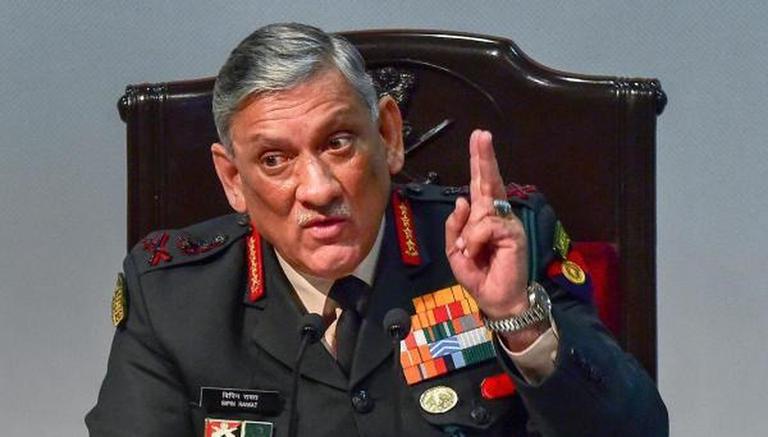General Bipin Rawat was a four star general of the Indian Army. He was the first and current Chief of Defence Staff (CDS) of India. On 30 December 2019, he was appointed as the first CDS of India and assumed office from 1 January 2020.
Prior to taking over as the CDS, he served as 57th and last Chairman of the Chiefs of Staff Committee as well as 26th Chief of Army Staff of the Indian Army.
Bipin Rawat passed away after an army helicopter carrying him along with several others crashed in Tamil Nadu.
General Rawat’s staff and family members were also among the nine people on board.
Early Life.
Rawat was born in Pauri, Uttarakhand. He went to Cambrian Hall School in Dehradun. He is also the alumnus of St. Edward’s School, Shimla. Later, he joined the National Defence Academy in Khadakwasla and the Indian Military Academy in Dehradun.
His family had been serving in the Indian Army for multiple generations. His father Laxman Singh Rawat served as the Lieutenant General in the army.
Moreover, he completed an MPhil in Defence Studies as well as a diploma in Management and Computer Studies from Madras University. He also completed his research on military media strategic studies and was awarded Doctorate of Philosophy (PhD) from Chaudhary Charan Singh University, Meerut in 2011.
Military career
After graduating from the National Defence Academy (NDA) and the Indian Military Academy (IMA), Rawat was recruited into the Indian Army in December 1978 and was enlisted in the same unit as his father, the fifth battalion of 11 Gorkha Rifles.
After a series of operational and staff postings in Jammu and Kashmir and at Army Headquarters in New Delhi, Rawat commanded his Gurkha battalion in the Eastern Sector
Promoted to the rank of brigadier, Rawat commanded a Rashtriya Rifles or RR unit in Sopore, north of Srinagar, which at the time was a hotbed of militancy.
As Major General, he took charge of an infantry division at Uri in Kashmir, before commanding 3 Corps at Dimapur, once again in the northeast, as a three-star officer.
Promoted Southern Army Commander in Pune in early 2016, Rawat assumed the post of Vice Chief of Army later that year, before becoming the Chief of Army Staff soon after.
Doing so, he superseded two senior officers, regrettably stoking a major controversy in which he was accused, especially by senior serving and retired military officers, of nepotism and of having gratuitously politicised his appointment.
Rawat was also the third Gurkha Rifles officer to become India’s army chief that also included Field Marshal Sam Manekshaw and General Dalbir Singh Suhag.
He was appointed as India’s first Chief of Defense Staff (CDS) on December 31, 2019.
Role in Kashmir and Controversial Statements.
Having served in Kashmir, General Bipin always had stern views over the issues in Kashmir valley. He had his fair share of skirmishes of across the border. While his statements against Pakistan and counter surgency operations can be taken as a form of nationalistic approach coming from an army chief of staff. However, it was his statements with regards to Kashmiri people and children that drew criticism.
Bipin Rawat courted controversy after he claimed that so-called “deradicalisation” camps are operating in India, drawing a comparison with the internment of Uighurs in China.
“Like what we are seeing in Kashmir … we saw radicalisation happening,” Rawat said addressing the media and foreign delegates in New Delhi last year.
“There are people who have completely been radicalised. These people need to be taken out separately, possibly taken into some deradicalisation camps. We have deradicalisation camps going on in our country.”
Confirming Rawat’s claims, a senior police official in Kashmir told Al Jazeera that the first “deradicalisation” centre in Kashmir is on the cards.
In 2017, Rawat backed an Indian Army officer who tied a Kashmiri youth to a jeep to prevent stone-pelters from targeting his convoy. He went on to award the officer who faced court-martial because of his questionable conduct in another controversy.
Another controversial comment the Rawat made about Kashmir was when he said people in Jammu and Kashmir are now saying that they will “lynch terrorists”, which is a “positive sign”.
“Locals are giving information about terrorists,” he said at the Times Now Summit. “Now they are saying they will lynch the terrorists, which is a very positive sign that is coming in. If there is a terrorist operating in your area, why should you not lynch him?” he had said.
it suggested that he meant to use the people of Kashmir as a shield for potential excesses by security forces. He claimed Kashmiris had offered to do the lynching or “make arrangements that they get lynched”.
The language used by the head of country’s defence spoke of street violence which is unacceptable.
Political Inclination.
More than once, he has made comments that are partisan, supporting the ideology of the ruling Bharatiya Janata Party.
Many believe that Rawat’s proximity to the ruling Hindu nationalist government helped him become India’s first-ever chief of defence staff – who will supervise all three wings of the defence forces.
According to the Indian Army Rules of 1954, officers are barred from commenting on politics.
The rule states: “No person subject to the Act shall deliver a lecture or wireless address, on a matter relating to political question or on a service subject or containing any information or views on any service subject without the prior sanction of the Central Government or any officer specified by the Central Government in this behalf.”
However, that has not deterred the former army chief, and now the chief of defence staff, from making controversial political statements.
